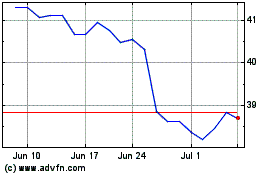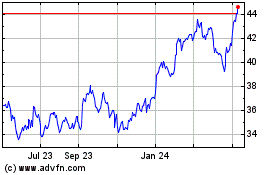By Thomas M. Burton
The Trump administration's nominee to lead the Food and Drug
Administration plans to recuse himself for a year from FDA
decisions on more than 20 companies, including some drug
giants.
Scott Gottlieb in recent years has held positions and received
millions of dollars in income as adviser, executive, paid speaker
or consultant to the companies, according to financial-disclosure
documents he has filed with government ethics officials.
Among the companies are cancer-therapy startups, such as Cell
Biotherapy Inc., and large concerns, such as GlaxoSmithKline PLC
and Bristol-Myers Squibb Inc.
Much of that work involved assessing the prospects of fledgling
companies, investing in some and advising them on medical and
regulatory matters.
Dr. Gottlieb, a physician, has provided some of that seed money
himself. Other venture capital came from New Enterprise Associates,
where he has been a venture partner, and from T.R. Winston &
Co., where he has been a managing partner and investment
consultant.
The consulting work for GlaxoSmithKline, for which he was paid
$87,153 in 2016 through the first two months of 2017, involved
helping the company make decisions about drugs in its research
pipeline.
In all cases, Dr. Gottlieb pledged to ethics officials at the
Office of Government Ethics to recuse himself from involvement with
the medical companies at the FDA for a year after resigning
positions and divesting his interests.
An FDA commissioner rarely is required to get involved in
company-specific decisions, instead directing policy covering
entire industries.
Dr. Gottlieb's work with such a wide range of drug firms could
provide fodder for Senate Democrats to attack his nomination in
hearings scheduled for next week. Unlike some other Trump cabinet
members who are relative novices to federal government, Dr.
Gottlieb previously served in government, as a deputy FDA
commissioner under President George W. Bush.
According to the documents, during 2016 and through March 1,
2017, when the disclosure period ends, Dr. Gottlieb made more than
$3 million in gross income. The income included a retainer and
bonus of $1.85 million from T.R. Winston, as well as $280,000 as a
consulting retainer from New Enterprise and salary of $210,916 from
the American Enterprise Institute, a conservative think tank.
Earlier data in a federal database, covering 2013 through 2015,
show that Dr. Gottlieb had collected $413,000 from medical
companies, mostly in consulting and speaking fees.
Dr. Gottlieb's ties to 19 of the companies in the newer
disclosure forms stem from his position with New Enterprise and
T.R. Winston.
At New Enterprise, he invested in six early-stage companies
specializing in areas such as kidney disease, pathology and
radiology. They include American Pathology Partners, Radiology
Partners and U.S. Renal Care. He plans to divest interests in all
the companies, according to decisions reached with the Office of
Government Ethics and ethics officials with the Department of
Health and Human Services.
Some critics of Mr. Gottlieb say their concerns focus on his
views of FDA regulation -- not his finances.
Jerome Avorn, a Harvard Medical School professor who has
extensively studied the drug industry, said, "You can't recuse
yourself from your ideology. Scott has been very candid that he
would like a lighter regulatory touch" at the FDA.
Dr. Gottlieb has generally advocated for quicker and simpler FDA
approvals, a view that aligns him in some ways with President
Donald Trump.
Dr. Gottlieb's attorney, Leslie Kiernan of the Washington firm
Akin Gump Strauss Hauer & Feld, said, "Every nominee who goes
into government from private industry will have some recusals. But
Scott brings a unique combination of experience. He understands how
startups work, and it's valuable for a regulator to understand
this."
At T.R. Winston, Dr. Gottlieb has recently held financial
interests in 13 companies, such as Cell Biotherapy, a
cancer-research company; Kure, a retailer of vaping products; and
Tivorsan Pharmaceuticals, a maker of an early-stage
muscular-dystrophy drug.
T.R. Winston often put its own money into such companies and
raises other funds from investors.
Dr. Gottlieb also agreed to resign his consultancy relationship
with Glaxo, in which he served as a drug-research adviser. He has
said he won't be involved in any Glaxo decisions for a year after
ending the relationship.
In the case of Bristol-Myers, his disclosures say he "previously
provided" consulting services to the company, without stating a
dollar figure for income or giving detail. But he pledged to have
no official dealings with the company for a year.
Another issue that could raise possible issues concerns 24
speaking honoraria totaling more than $200,000 during 2016 and the
first two months of 2017. These include $10,000 from Merck &
Co., $11,250 from the Generic Pharmaceutical Association and
$11,250 from Biogen Inc.
Write to Thomas M. Burton at tom.burton@wsj.com
(END) Dow Jones Newswires
March 29, 2017 00:15 ET (04:15 GMT)
Copyright (c) 2017 Dow Jones & Company, Inc.
GSK (NYSE:GSK)
Historical Stock Chart
From Mar 2024 to Apr 2024

GSK (NYSE:GSK)
Historical Stock Chart
From Apr 2023 to Apr 2024
